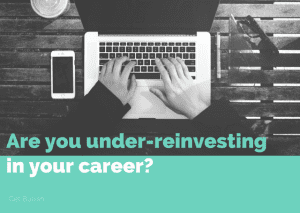I was introduced to the word “under-reinvesting” by an entrepreneur who had been told by the venture capitalists who had funded his startup that it was a mistake to have money in the bank — in the world of venture capital, where it’s astronomical-returns-or bust, having money in the bank was a sign that revenue was not being reinvested in the business, thus making those astronomical returns less likely.
Are you under-reinvesting?
One of of the things I do for a living is coach teenagers for the SAT. When they are in the midst of their AP-exams-plus-SAT junior year misery, I always tell them: every hour of fun you don’t have now is likely to lead to many more hours of fun later, when you are an adult and have your own money and can legally have fun in places that serve alcohol. My senior year in high school, I applied to 125 scholarship competitions. It was not fun. But: invest time now, and later you are more likely to be able to buy all the shoes and matching eyeglasses you want. It’s like compound interest.
The same applies to actual money, of course. Except that actual interest rates right now are pathetic. If investing in your own career or business idea generates more than a 1.5% return, you’ve beat the market.
Over the last few weeks, Bullish has covered saving money without acting like a Depression-era granny and saving up an emergency fund. But when is it important to save, and when is it important to reinvest?
I think a lot of “make coffee at home instead of having that latte” rhetoric is a bit of a holdover from some previous time in which salarymen worked for a single company for a long time and the lack of internet made it harder to develop a profitable sideline or cobble together a living from a variety of different pursuits. In articles that helpfully remind us that our daily trip to Starbucks could be costing us $1,000 a year, I often read some variation of, “It’s easier to save money than to make money.”
But if you’ve got lifeblood running through your veins, mojo animating your being, prana in your chakras, etc., this is misleading.
Hear me out on this. Obviously, if you are living an extravagant lifestyle (i.e., Fergie, the British one), you could slash your expenses by 95% and still get by just fine. But, for most of us, the slashing of expenses isn’t that dramatic and is going to lower our quality of life substantially. I am a member of FreshDirect’s “Chef’s Table” program, which is a fancy way of saying that I give them a lot of money. I think you might really have to try (and buy a lot of alcohol) to achieve that distinction as a single person who lives alone. It would be possible to slash my food budget in half — but at the expense of one of the most enjoyable things in my life.
There is a serious floor to how much you can cut expenses. I might be able to cut my food bill in half; if I gave up my iPhone and switched to something that didn’t allow me to study Swahili on the subway, I could cut my cell phone bill in half. As percentages, those figures sound impressive, but as actual dollars, we’re talking about a couple thousand bucks a year. By living ascetically, I could put an extra $2,000-$4,000 in the bank. That’s all fine and good if that’s your only option. But it probably isn’t.
If you are regularly possessed of good ideas and the energy with which to carry them out, it’s a better use of your time to strive to maximize income, rather than to minimize expenses, as income is more fluid than expenses.
In my hometown of Virginia Beach (as of 2010), a bunch of 1-2 bedroom apartments are listed for about $600 – $1600, and it looks like a person could live someplace pretty decent for about $850. The minimum wage is $7.25. People in top jobs — I’m thinking lawyers here, not millionaire housing developers — bill at $300 an hour. In other words, rent varies about 166%. Income varies over 4,000%. In New York, it’s a little harder to calculate because of the presence of the superrich, but their addition to the equation only makes the point more dramatic. Wages have a lot more wiggle room than expenses.
Now, it’s certainly easier to cut expenses than to make more money. Anyone can cut expenses. Old ladies with coupon-clipping scissors can cut expenses. But there are serious limits as to how far you can cut. Attempting to double your income over the next five years requires more focus and cleverness, but offers an uncapped potential. Over the last five years, I’ve more than doubled my income — but I haven’t found a less-than-half-price apartment, or a way to squeeze down the cost of a can of beans by another 50%.
So, if you are young and smart, I think that living like a senior citizen on Social Security is a case of under-reinvesting.
What would it look like to reinvest instead of over-saving?
Let’s be clear: you should definitely save up an untouchable emergency fund, and if you have credit card debt, you need to take care of that first, either by cutting back or developing an immediately profitable sideline or second job.
But once you’ve got that taken care of, think about the next $2,000 you make and don’t immediate need in order to live. Obviously, you could spend it. You could put it in the bank, in a retirement fund, or in a money market account. Or you could re-invest. If you’re self-employed or an entrepreneur, you probably reinvest all the time. The best use of about $2,000 I ever made was when I promoted the internet marketing company I ran at the time by holding a day-long internet marketing conference for small businesspeople at a local private club. I made back the entire $2,000, and discovered that people really, really love to hire someone they’ve previously seen behind a podium. A few years later, I spent about five months doing unpaid, nearly full-time training to qualify for a gig I now have. And I maxxed out: I didn’t save a penny during that period. Instead, I hired someone to run my errands so I could do even more unpaid training. The gig was, as it turned out, pretty life-changing.
If you are employed in a regular job, re-investing options include taking a class to learn a new skill (it’s good to be a young whippersnapper who knows how to increase the search engine rankings through Twitter), attending conferences in your industry that your employer won’t pay for, or flying around the world to personally meet up with a mentor in your field. (While telling a luminary in your field that you’re flying from New York to San Francisco to have dinner with her is a bit creepy, you can always try “It just so happens that I’ll be in town for two days” and see if that prompts action — after all, scarcity enhances the perception of value! See more here on How Business is Like Dating).
By the way, a recession is a great time to start a business. And when you’re young and sprightly is also a great time to get moving. An entrepreneurial drive is much like a sex drive; strong (although perhaps unfocused) when you’re young, peaking at some point thereafter, and, for most people, in decline everafter. Time to reinvest is while you’ve still got the mojo to do so.
originally published on The Gloss










